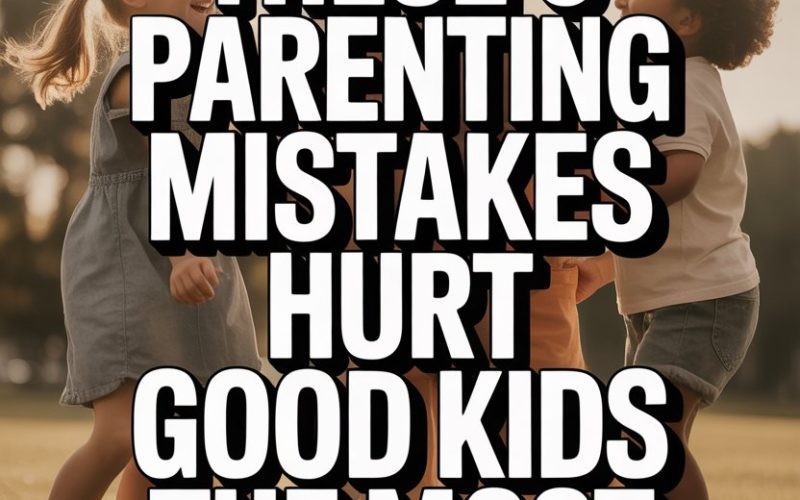Parenting—equal parts love, worry, and wondering if you’ll ever get to pee alone.
Every parent I know wants to raise children who are happy, kind, and resilient, but even “good kids” can stumble when their parents fall into certain traps.
The trickiest part? These mistakes aren’t glaring. They sneak in during hectic mornings, tired evenings, and those moments you’re just trying not to lose your mind.
1. Overpraising for Every Little Thing
We’ve all heard the advice: build them up! Make them feel special! Tell them they’re brilliant at everything from tying a shoe to breathing.
The catch? Over-the-top praise for every small achievement can chip away at a child’s grit.
According to a recent study, kids who are constantly told they’re “so smart” or “the best” start to avoid tasks they might not ace.
After all, why try if failure means you’re no longer a genius?
You don’t have to go full Simon Cowell, but try to praise effort, not just results. “You worked hard on that maths problem!” lands better than “You’re a maths genius!”
Save the applause for real effort or kindness, and you’ll see resilience bloom.
And yes, it’s OK if your kid is just average at stacking blocks. The world needs mediocre block stackers too.
2. Not Allowing Kids to Fail (Ever)
Wouldn’t it be lovely to live in a world where your child never faces heartache, disappointment, or the agony of losing at snakes and ladders?
Unfortunately, that world exists only in fever dreams and chocolate advertisements.
Shielding kids from every stumble might seem loving, but it leaves them without a toolkit for real life.
According to a clinical psychologist expert, learning how to manage disappointment, make mistakes, and try again is what builds grit and independence.
Let them bomb that spelling test. Allow them to forget their lunch once (they’ll survive). Stand back when they argue with a friend.
Resisting the urge to rescue teaches them resilience you can’t buy in a shop.
Bonus: you’ll spend less time running forgotten jumpers to school. Everybody wins.
3. Confusing Discipline With Punishment
It’s tempting to throw the book at kids when they mess up—especially on days when you’ve had less sleep than a new puppy. But there’s a world of difference between discipline and punishment.
Discipline means teaching, guiding, and helping kids understand the impact of their choices. Punishment often just means making them suffer.
The American Academy of Pediatrics points out that harsh punishments and yelling can damage trust and self-worth, making kids more likely to hide mistakes.
Natural consequences work wonders. If a child refuses to wear a coat, let them feel a bit chilly (with a hat in your bag just in case). If they break a toy, don’t run to replace it.
Kids need boundaries, yes, but ones that teach—not just punish.
Repeat after me: the naughty step is for chairs, not for crushing spirits.
4. Doing Everything for Them
It’s quicker to tie their laces yourself. It’s easier to clean the bathroom after their “help.” But when parents handle every task, kids miss out on the chance to feel capable.
Children who never get to practice basic skills (making toast, packing a bag, saying sorry) end up believing they can’t manage on their own.
Harvard’s Center on the Developing Child notes that kids build confidence and self-control when trusted to tackle age-appropriate challenges.
Start small. Give them jobs even if they do them “wrong.” Let little ones pour the milk, even if it’s a cow-sized spill. Older kids can take public transport, earn pocket money, or make their own snack.
The goal isn’t perfection; it’s building that sweet, sweet self-reliance.
And yes, sometimes letting them do it means you’ll leave the house 11 minutes later. But hey, you’ll all survive.
5. Not Modelling Apologies or Emotional Regulation
Kids are, believe it or not, experts at detecting hypocrisy. If you’re yelling “CALM DOWN!” at them while simultaneously hurling a plastic dinosaur across the lounge, the message gets a little muddy.
Many parents struggle to model calm, respectful apologies. We expect our kids to say sorry and move on, but when they see adults refusing to own up, they learn that apologies are just for children.
A research published in NIH shows that parents who apologize and manage their own emotions are more likely to raise empathetic, emotionally intelligent kids.
Messed up? Lost your rag? Tell your child, “I was cross and I shouldn’t have shouted at you. That wasn’t fair. I’m sorry.”
You aren’t giving up authority—you’re teaching humility and respect.
Kids who see parents make amends learn that mistakes don’t make you unlovable, just human.
Plus, when your child starts to apologise to their sibling for hiding the last biscuit, you’ll know it’s working.
6. Ignoring Their Mental Health and Emotional Needs
We all want kids to be tough—but “tough” shouldn’t mean bottling up every feeling until it explodes out the top like a well-shaken lemonade.
Brushing off their worries (“Don’t be silly, there’s nothing to be scared of!”) or shaming their tears teaches kids to bury emotion and pretend everything’s fine—even when it’s not.
The NHS and every decent therapist on earth agree: kids need to know that all feelings are valid, even those big, messy ones.
Make space for emotions, even when they’re inconvenient. “You seem sad. Want to talk or cuddle?” goes far. Encourage them to use words for feelings, not fists or sulks.
And if your child seems persistently anxious or withdrawn, reach out to a professional or your GP—no shame, no guilt.
Kids who grow up with emotional safety become adults who can talk about what they need. Which is handy, since therapists are expensive.
Raising Resilient, Happy Kids (Without Losing Your Mind)
Parenting is a constant loop of learning, apologising, adjusting, and occasionally hiding in the bathroom to scroll your phone.
The truly scary stuff? The mistakes that slip in when you’re doing your very best.
It’s not about aiming for perfection. Every parent stumbles on these six mistakes now and then—usually when you’re out of coffee and patience.
The good news? A little awareness, a smidge of humility, and the bravery to try something new can change everything.
Start by picking just one of these to work on. Maybe you’ll let your child butter their own toast tonight, or you’ll take a deep breath before responding to a meltdown.
Bit by bit, small changes add up.
Your kids don’t need perfect parents. They need parents who care enough to keep trying—and who love them through every messy, glorious, heart-bursting moment.




